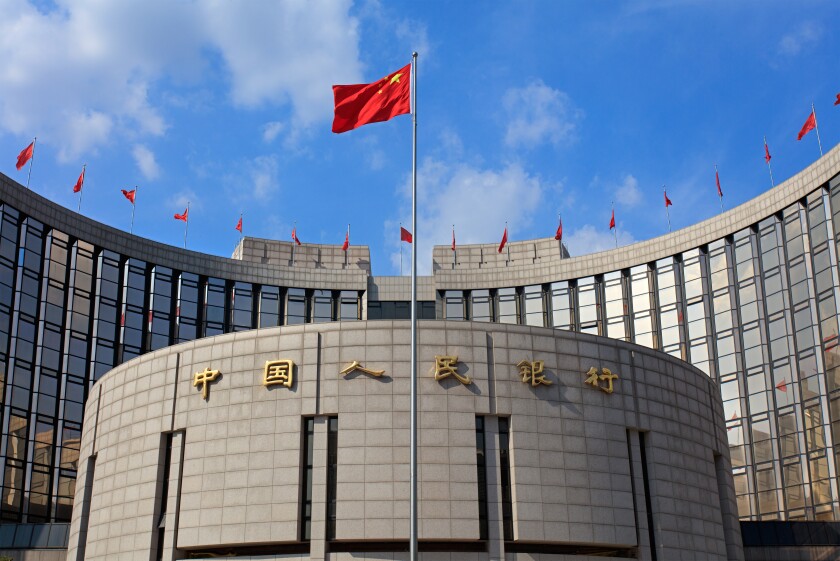China’s economic growth slowed to 4.9% year-on-year in the third quarter, from 7.9% the previous quarter, data from the National Bureau of Statistics showed on Monday. The consensus forecast had been 5%.
The country’s GDP totalled Rmb82.31tr ($12.8tr) for the first three quarters of 2021, showing a 9.8% increase.
“The only surprise in China’s published GDP figures is that they have not come in lower” after “a wave” of tightening in monetary, fiscal and regulatory policies, said Paras Anand, Fidelity International’s chief investment officer, Asia Pacific, in a Monday note. The firm expects China’s GDP growth to come in at around 8.2% for the full year.
For September, industrial production jumped 3.1% year-on-year, and 11.8% for the first nine months combined. Retail sales were up 4.4% last month and 16.4% by the end of the third quarter. Fixed asset investment recorded a 7.3% annual growth over the nine-month period.
*
China will continue implementing “proactive fiscal policies and prudent monetary policies” to support its economic recovery, central bank governor Yi Gang said at the 44th meeting of the International Monetary and Financial Committee held on October 14.
*
Nineteen banks have been named domestic systemically important banks (D-Sibs) in China, the People’s Bank of China (PBoC) and China Banking and Insurance Regulatory Commission announced last Friday. The inaugural list comprises six state-owned banks, nine joint stock commercial banks, and four city commercial banks.
The D-Sibs must comply with additional requirements on their common equity tier one ratios — of 0.25%, 0.5%, 0.75%, 1% and 1.5% for D-Sibs assigned into five different groups — on top of the current minimum regulatory requirement of 7.5%.
Bank of Beijing, Bank of Jiangsu, Bank of Ningbo, Bank of Shanghai, China Everbright Bank, China Guangfa Bank, Huaxia Bank and Ping An Bank belong to group one, meaning they are subject to additional capital requirement of 0.25%. In group two are China Citic Bank, China Minsheng Banking Corp, Postal Savings Bank of China and Shanghai Pudong Development Bank. Bank of Communications, China Merchants Bank and Industrial Bank are group three lenders, with the big four state-owned banks in group four. No lender made it to group five, which has the strictest capital requirement.
*
The PBoC said last Friday it will guide major banks to “accurately grasp and implement” Beijing’s real estate financing policies, maintain “stable and orderly” credit distribution to the sector, and safeguard the stable and healthy development of the property market.
The risk of a spill-over from China Evergrande Group’s debt crisis to the financial industry is “controllable”, the central bank added.
*
Hong Kong’s Financial Reporting Council (FRC) said last Friday that it has initiated an enquiry into Evergrande’s financial statements for the full year 2020 and the first half of 2021, after it “identified questions about the adequacy of reporting on going concern”. Going concern is an accounting term assuming an entity will continue to be in business for the foreseeable future.
The FRC has also launched an investigation into the audit by PricewaterhouseCoopers of the company’s 2020 results.
*
The Ministry of Finance has mandated 14 Chinese and foreign banks for a $4bn multi-tranche bond in the 144A/Reg S format, to be launched on Tuesday. Calls with fixed income investors will be held on Monday.
The dollar issuance will be followed by the MoF’s Rmb6bn dim sum auction in Hong Kong on Wednesday.
*
The PBoC kept the medium term lending facility (MLF) rate unchanged at 2.95% last Friday when it injected Rmb500bn of one year MLF loans into the banking system. The central bank also conducted Rmb10bn of seven day reverse repos at 2.2%.
*
Goldman Sachs has received approval to own 100% of its China securities joint venture, Goldman Sachs Gao Hua Securities Co, the US firm announced on Sunday.
Last December, Goldman agreed to buy the 49% stake held by its Chinese partner, Beijing Gao Hua Securities, in the JV, which will be renamed Goldman Sachs (China) Securities Co.
*
The Shanghai and Shenzhen stock exchange have accepted applications for three infrastructure real estate investment trusts (Reits), with industrial parks and expressways as the underlying projects. China’s first batch of nine Reits were listed in June.
*
The China Securities Regulatory Commission (CSRC) published the results of its annual evaluation on Chinese futures companies. Seventeen firms received the highest AA rating, versus 19 in 2020. Five companies are the lowest rated at D, including Hehe Futures that got a five-notch downgrade.
*
Qualified foreign investors (QFIs) can trade commodity futures, commodity options and stock index options beginning November 1, the CSRC announced last Friday.
The current QFI scheme is a combination of the qualified foreign institutional investor (QFII) and renminbi QFII (RQFII) schemes. The CSRC also said it will make available more onshore products to foreign investors when appropriate.
*
Chinese securities companies must appoint spokespersons, according to new guidelines published last Friday by the Securities Association of China on reputation management of securities firms.
*
Regulators including the CSRC are working on rules to regulate online brokers’ domestic operations to protect investors, onshore newspapers, including the Securities Times, reported.
The reports came after US-listed Futu Holdings and UP Fintech Holding were sold off last week following a People’s Daily article about regulatory risks facing online brokers.
*
Regulators held a meeting recently with some banks’ wealth management subsidiaries, asking them to reduce the amount of cash management products they sell, according to the China Securities Journal.

